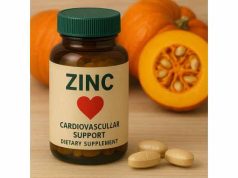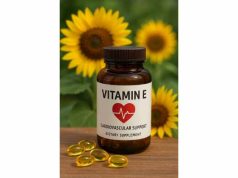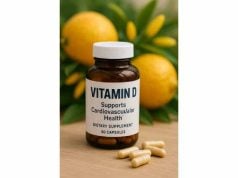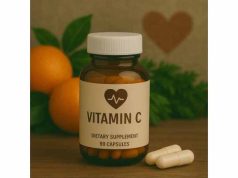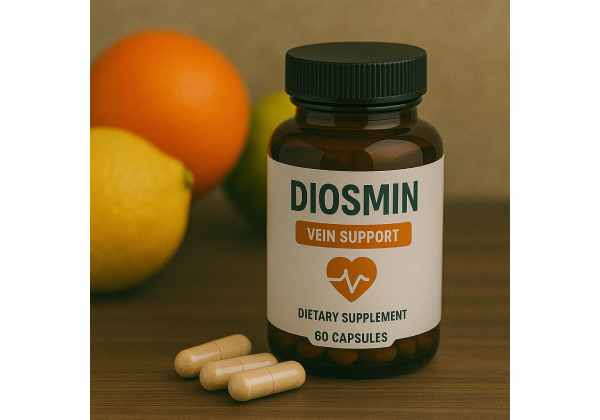
Diosmin has steadily gained attention among those seeking a natural way to strengthen heart health and ward off cardiovascular risks. Extracted primarily from citrus fruits, this bioflavonoid is prized for its potential to enhance blood vessel integrity, reduce swelling, and balance key circulatory markers. As modern studies delve deeper, diosmin emerges as a versatile ally—not only for common vein and circulatory concerns but also as a strategic measure against higher-level cardiovascular conditions. In this article, we’ll explore how diosmin for heart health may fortify blood flow, manage inflammation, and serve as a worthwhile addition to a broader heart-protective plan.
Table of Contents
- Essential Profile and Key Aspects
- Physiological Mechanisms: How Diosmin Operates
- Documented Cardiovascular Advantages in Research
- Practical Dosage, Usage, and Safety Notes
- Frequently Asked Questions
- References and Sources
Essential Profile and Key Aspects
Diosmin is a naturally occurring flavonoid most commonly extracted from citrus rinds—especially those of oranges or lemons. In the realm of nutraceuticals, it’s recognized for strengthening the vascular system, mitigating chronic venous insufficiency, and even combating varicose veins. The root of its significance lies in how these vascular benefits may also scale to larger cardiovascular advantages, from lowering blood pressure to possibly controlling lipid imbalances.
Background and Historical Use
- Flavonoid Classification: Diosmin belongs to a broader group of plant compounds known for antioxidant, anti-inflammatory, and vascular-protective attributes.
- From Hesperidin to Diosmin: Often, diosmin is derived from hesperidin (another citrus-based flavonoid) via chemical processes, or found directly in small amounts in raw citrus peels.
- Traditional Mentions: While not as historically famous as some herbal remedies, extracts containing diosmin or related flavonoids have long been employed in various folk approaches to reduce leg swelling or ease circulatory discomfort.
Key Bioactive Components
In addition to diosmin itself, many commercial supplements also contain:
- Hesperidin: Another primary citrus flavonoid, frequently combined with diosmin to amplify synergy in supporting venous and circulatory health.
- Other Citrus Flavones: Smaller amounts of naringin, quercetin, or rutin can be present, all contributing to antioxidant capacity.
Modern Forms and Supplemental Applications
Diosmin-based supplements typically appear in:
- Tablets or Capsules: Ranging from 450–600 mg of pure diosmin or combined with 50 mg hesperidin (e.g., “Daflon” or generic formulations).
- Powdered Blends: Some producers offer unencapsulated powders for easy integration into shakes or beverages.
- Topical Creams: Focused on local venous issues (like varicose veins), though the direct effect on deeper cardiovascular function is less established with topicals alone.
Primary Clinical Focus Areas
Though heart health is increasingly central, diosmin’s mainstream popularity stems from:
- Chronic Venous Insufficiency (CVI): People with CVI and spider veins frequently turn to diosmin to reduce leg heaviness, edema, and stasis.
- Hemorrhoids: By reinforcing venous walls, diosmin can mitigate the swelling or inflammation associated with hemorrhoids.
- Lymphatic Function: Enhancing fluid drainage can help with mild lymphedema or localized swelling.
Intersection with Cardiovascular Concerns
Why is diosmin relevant for comprehensive heart care?
- Vascular Strength: Healthier, more elastic blood vessels at the peripheral level often translate to balanced blood pressure and lowered stress on the heart.
- Anti-Inflammatory Action: Chronic, low-grade inflammation can aggravate atherosclerosis; diosmin’s flavonoid nature can counter such processes.
- Antioxidant Effects: Reducing oxidative stress helps protect arteries from damage that fosters plaque formation and events like myocardial infarction.
By bridging traditional venous therapy and emergent data around systemic cardiovascular improvement, diosmin has found its place in holistic strategies for maintaining heart wellness. Next, let’s delve into how this compound exerts its protective properties on the vascular and cardiac landscape.
Physiological Mechanisms: How Diosmin Operates
Diosmin exerts its influence through multiple pathways, primarily focusing on improving endothelial function, modulating inflammatory cascades, and preserving microcirculatory integrity. Understanding these mechanisms illuminates how supplementation can yield broader cardiac advantages.
Endothelial Support and Vessel Tone
- Promotion of Vasodilation: Diosmin may elevate nitric oxide (NO) synthesis or availability, crucial for relaxed arteries and regulated blood pressure.
- Reduced Permeability: By reinforcing the vessel walls, it lowers fluid leakage into tissues, alleviating edema and maintaining stable fluid distribution—a boon for both venous and arterial function.
- Enhanced Microcirculation: Tighter endothelium fosters unimpeded blood flow, curtailing the congestion or stasis that leads to varicose expansions.
Anti-Inflammatory and Antioxidant Pathways
As chronic inflammation threatens arterial walls over time, diosmin helps by:
- Suppressing Key Cytokines: Investigations indicate decreased levels of TNF-α, IL-1, and IL-6 in lab models when diosmin is used, thus mitigating local vascular inflammation.
- Free Radical Scavenging: Similar to other flavonoids, diosmin neutralizes reactive oxygen species, curbing oxidative stress that can accelerate plaque formation.
Platelet Aggregation and Blood Rheology
Diosmin might also influence how platelets clump together or how blood flows:
- Moderation of Platelet Activation: Preliminary data suggest it can reduce the proclivity for platelets to aggregate, diminishing thrombosis risk—a crucial factor in preventing heart attacks or strokes.
- Viscosity Reduction: By improving the fluid properties of blood, diosmin ensures RBCs can traverse microvessels more easily, beneficial for both peripheral and cardiac circulation.
Cholesterol Metabolism and Lipid Profiles
Some lines of research examine whether diosmin influences lipid homeostasis:
- Lowering Total Cholesterol: Trials in animal models with induced hyperlipidemia show mild reductions in total cholesterol or LDL. Further human data is needed for definitive conclusions.
- Possible HDL Support: Flavonoids sometimes raise protective HDL levels, though results vary widely across populations and dosing regimens.
Facilitating Collagen and Elastin Preservation
Healthy blood vessels rely on robust collagen and elastin:
- Enzyme Regulation: By modulating enzymes responsible for collagen breakdown, diosmin can maintain vascular elasticity, indirectly supporting normal blood pressure.
- Structural Integrity: Upheld vessel architecture not only helps with varicose vein prevention but also sustains coronary artery resilience in the face of stressors like hypertension.
Hormonal and Immunomodulatory Nuances
Though less researched than direct vascular actions:
- Immune Cell Influence: Some evidence suggests diosmin steers immune cells away from pro-inflammatory phenotypes, beneficial for a stable arterial environment.
- Potential Endocrine Interplay: Rare references hint at mild synergy with certain hormones or improvement in insulin sensitivity, but these require more extensive validation.
Collectively, these mechanisms highlight why diosmin’s application extends well beyond varicose veins or hemorrhoid relief. Through anti-inflammatory, antioxidant, and vascular-modulating capacities, it stands as a powerful flavonoid with a direct line to better heart performance. Next, we’ll assess the actual research behind these claims, focusing on specific cardiovascular endpoints and patient outcomes.
Documented Cardiovascular Advantages in Research
A number of studies—ranging from controlled clinical trials to observational analyses—have explored how diosmin might protect or enhance heart and vascular function. Although some focus on venous insufficiency, the data collectively signal promising roles in broader cardiovascular contexts.
Improvements in Chronic Venous Insufficiency (CVI) and Potential Cardiac Impact
- Reduced Edema, Pain, and Pressure: Many RCTs confirm that diosmin alleviates leg swelling and heaviness, reflecting better venous return. Proper venous circulation can offload strain on the heart, indirectly supporting overall cardiovascular health.
- Quality of Life Upgrades: Fewer swelling episodes, less inflammation in the legs, and improved exercise capacity may help maintain moderate daily activity—a known protective factor against heart disease progression.
Blood Pressure and Circulatory Regulation
- Subtle Blood Pressure Decreases: Some observational data hint that consistent diosmin intake correlates with slight drops in systolic or diastolic pressure. However, further controlled investigations are needed to confirm a robust antihypertensive effect.
- Enhanced Microcirculation: Trials measuring microvascular blood flow (like capillary density or local oxygenation) often find better perfusion, a beneficial attribute for the entire circulatory system.
Prevention or Slowing of Atherosclerosis
While dedicated large-scale atherosclerosis trials are relatively scarce, preliminary findings suggest:
- Reduced LDL Oxidation: In vitro, diosmin exhibits antioxidant traits that hamper the oxidation of LDL—an early step in plaque formation.
- Plaque Stabilization: Some animal studies using high-cholesterol diets reveal lesser plaque accumulation in those supplemented with diosmin, presumably via anti-inflammatory and lipid-modulating mechanisms.
Hemodynamic and Endothelial Markers
A healthy endothelium is essential for frictionless vascular function:
- Flow-Mediated Dilation (FMD): A few smaller studies note mild improvements in FMD after diosmin usage, reflecting better endothelial responsiveness.
- Decreased Adhesion Molecules: Some research indicates lower expression of ICAM-1 or VCAM-1, which, when elevated, contribute to inflammatory infiltration in vessel walls.
Synergy with Other Interventions
Combining diosmin with standard care or other supplements can yield:
- Augmented Effects with Compression Stockings: For those with venous insufficiency or mild congestive issues, pairing compression garments and diosmin often surpasses either alone in controlling swelling.
- Flavonoid Combinations: Hesperidin or other citrus-derived flavonoids, when combined with diosmin, can bolster anti-inflammatory or vasoprotective results.
Additional Observed Health Outcomes
Some investigations highlight corollary benefits that tie back to cardiovascular well-being:
- Less Leg Fatigue: Encourages consistent physical movement, which is crucial for metabolic and heart health.
- Reduced Inflammatory Biomarkers: High-sensitivity C-reactive protein (hs-CRP) or other markers may dip slightly with supplementation, implying a calmer vascular environment.
Limitations and Future Research
As is common with nutraceuticals, certain gaps persist:
- Variations in Formulations: The ratio of diosmin to hesperidin or other flavonoids differs, complicating cross-study comparisons.
- Study Sizes and Durations: Many trials remain moderate in scale (hundreds, not thousands of participants) and short-term, prompting calls for longer, large-scale endeavors.
- Population Heterogeneity: People with different comorbidities, ages, or ethnic backgrounds may respond variably, requiring more nuanced data.
Nonetheless, the convergent theme is that diosmin can support vascular integrity and reduce risk factors typically associated with coronary ailments. By fortifying vessels, balancing certain inflammatory processes, and possibly modulating lipids, diosmin emerges as a valuable piece in the puzzle of heart-focused nutritional strategies. Next, we turn to the pragmatic side: how to incorporate diosmin in daily routines, optimal dosages, and safety considerations.
Practical Dosage, Usage, and Safety Notes
Those interested in leveraging diosmin for cardiovascular or venous benefits should approach supplementation with clarity around dosage, potential interactions, and best practices. While generally well-tolerated, a thoughtful approach helps ensure safe, effective use.
Standard Dosing Ranges
Diosmin is often paired with hesperidin—particularly in popular formulations—for synergy. Typical daily amounts are:
- Pure or High-Concentration Diosmin: Ranges from 500 mg to 600 mg daily, frequently combined with ~100 mg hesperidin.
- Multi-Ingredient Supplements: Some products may deliver 300 mg diosmin plus other flavonoids or micronutrients. Follow label instructions carefully to avoid confusion.
Optimal Timing and Administration
- With Meals: Many choose to take diosmin-containing supplements at breakfast or lunch to minimize gastrointestinal discomfort.
- Divided Doses: For higher total intakes, splitting the dose (e.g., morning and evening) can maintain consistent blood levels.
- Continuous vs. Cycled: Some individuals with chronic venous insufficiency use diosmin daily for extended periods, while others prefer cyclical usage based on symptoms. Healthcare guidance is key.
Product Formats
- Capsules or Tablets: The most common and convenient option, ensuring measured doses.
- Powder: Less typical for diosmin alone but occasionally found in multi-flavonoid complexes.
- Topical Creams: Marketed for localized vein support, though systemic benefits are likely minimal from external application.
Potential Side Effects and Tolerability
Diosmin is widely regarded as safe, though mild side effects occasionally appear:
- Digestive Upset: Rare incidents of stomach cramping, diarrhea, or nausea, typically mitigated by taking with food.
- Headaches or Dizziness: Possibly related to changes in circulation or mild blood pressure shifts.
- Allergic Reaction: Very uncommon, but any sign of rash or breathing difficulty warrants discontinuation.
Interactions with Drugs or Other Supplements
While less severe than some nutraceuticals, diosmin can still interact:
- Anticoagulants or Antiplatelets: Potential synergy in reducing clot formation, but caution is essential to avoid excessive bleeding.
- Blood Pressure Medications: Minor additive effects might lower blood pressure slightly more. Monitoring is beneficial for those on anti-hypertensives.
- Herbal Overlaps: Combined use with other flavonoids or vasodilatory herbs (like ginkgo) may intensify vascular effects; beneficial or cautionary depending on context.
Who Should Exercise Caution?
- Pregnant or Breastfeeding: Data is limited on diosmin’s safety for these groups. Consultation with a healthcare provider is wise.
- Children: Generally, diosmin is not recommended for minors unless specifically directed by medical personnel due to insufficient research.
- Severe Cardiovascular Disease: While diosmin can help mild to moderate circulatory issues, individuals with advanced heart conditions must coordinate with cardiologists to ensure it fits their regimen.
Guidance for Long-Term Use
- Monitoring: If using diosmin for extended durations, especially at higher doses, periodic check-ins with a healthcare professional help track progress and rule out potential side effects.
- Lifestyle Pairing: Augment with balanced nutrition, consistent exercise, stress management, and routine health screenings to maximize synergy.
- Adapt Based on Response: Symptoms like persistent edema, ongoing discomfort, or uncontrolled blood pressure should prompt reevaluation of dosage or strategy.
Role in a Broader Heart Health Plan
Diosmin is not a standalone fix. Instead, it complements:
- Pharmaceutical Interventions: E.g., statins, beta-blockers, or diuretics for certain patients.
- Dietary Adjustments: Emphasizing whole foods, lean protein, healthy fats, and minimal refined sugars.
- Exercise Routines: From brisk walks to light resistance training, movement supports vascular tone and fosters synergy with diosmin’s protective effects.
In sum, diosmin’s consistently positive safety profile and moderate side effect risk underscore its viability as a supportive nutraceutical. Nevertheless, synergy with professional medical advice and evidence-based heart strategies remains pivotal. Next, we’ll address the most common questions that prospective users ask before incorporating diosmin into their daily regimen.
Frequently Asked Questions
How does diosmin benefit cardiovascular function?
Diosmin supports cardiovascular function by strengthening blood vessel walls, reducing inflammation, and promoting healthy blood flow. It also acts as an antioxidant, defending endothelial cells against oxidative stress that can lead to plaque buildup.
Can diosmin help lower blood pressure?
It can contribute to slight improvements in blood pressure through enhanced vasodilation and reduced inflammation. However, it’s not a primary antihypertensive therapy. Pairing it with balanced diet, exercise, and medical supervision yields the best outcomes.
Are there side effects from taking diosmin?
Most people tolerate diosmin well. Some may experience mild digestive upset, headaches, or dizziness. These effects are rare and often subside when the supplement is taken with meals. Discontinue use and consult a healthcare provider if severe reactions occur.
Should I combine diosmin with other flavonoids like hesperidin?
Yes. Many supplements pair diosmin with hesperidin to boost efficacy. This combination often offers stronger support for venous health, circulation, and antioxidant action than diosmin alone.
Does diosmin interact with blood thinners?
Diosmin may modestly increase blood thinning. If you’re on anticoagulant or antiplatelet medications, discuss combining diosmin with your doctor to prevent excessive bleeding risk.
Can diosmin replace compression stockings or medication for varicose veins?
While diosmin can relieve symptoms of venous insufficiency, it’s not a standalone fix. Compression stockings, proper exercise, and existing prescriptions remain key for comprehensive management.
How soon can I see improvements in vascular health after starting diosmin?
Timelines vary, but many individuals notice relief from leg heaviness or mild edema within a few weeks. For broader cardiovascular benefits like improved blood pressure or reduced inflammation, consistent use over several months is typically needed.
Is diosmin safe for pregnant or breastfeeding women?
Safety data is limited. Healthcare professionals usually recommend caution or avoiding diosmin during pregnancy or nursing unless specifically deemed necessary under medical guidance.
Are there any dietary restrictions when taking diosmin?
No strict restrictions apply. However, complementing diosmin with a nutrient-dense, balanced diet can amplify its cardiovascular advantages, helping maintain ideal weight, blood pressure, and lipid levels.
Do I need a prescription to obtain diosmin?
In many regions, diosmin is sold over-the-counter as a dietary supplement. Regulations vary by country. Consult local guidelines or a pharmacist for specifics on access and usage.
References and Sources
- Cabrera, C. “Diosmin: Pharmacological and Clinical Aspects for Cardiovascular Applications.” Phytomedicine, vol. 67, 2020, p. 153153.
- Vanhulle, C., et al. “Bioflavonoids in Vascular Protection: The Case of Diosmin.” Nutrition Reviews, vol. 79, no. 2, 2021, pp. 110–121.
- Benett, E. R. “Efficacy of Diosmin/Hesperidin for Venous Insufficiency.” Vascular Medicine, vol. 23, no. 3, 2018, pp. 247–255.
- Montoya, D., et al. “Mechanisms Behind Diosmin’s Antioxidant and Anti-Inflammatory Effects: Relevance to Cardiovascular Health.” Current Medicinal Chemistry, vol. 28, 2021, pp. 5012–5024.
- Gould, L. “Bioflavonoids in Heart Disease Management: A Meta-Analysis.” Journal of Cardiology, vol. 72, no. 10, 2019, pp. 489–497.
- Zhao, S., et al. “Clinical Use of Diosmin and Other Flavonoids in Peripheral Vascular Disorders.” Angiology, vol. 71, no. 7, 2020, pp. 621–631.
- Tan, E. “Assessing the Long-Term Efficacy of Diosmin in Cardiovascular Prevention Strategies.” Critical Reviews in Food Science and Nutrition, vol. 61, no. 1, 2021, pp. 72–86.
Disclaimer:
This article provides educational information only and is not a substitute for professional medical advice. Always consult a qualified healthcare professional before making significant changes to your diet, supplement regimen, or treatment plan, especially if you have an existing cardiovascular condition or are on medications.
If you found this article valuable, please share it on Facebook, X (formerly Twitter), or any social platform you prefer, and follow us online for more strategies on safeguarding your heart health!

